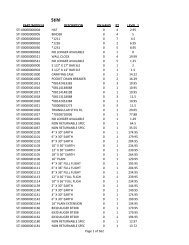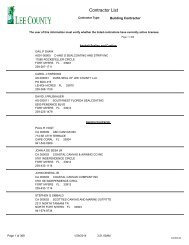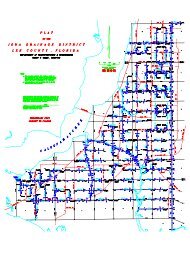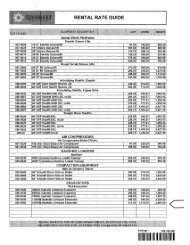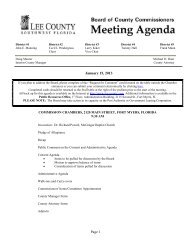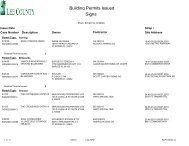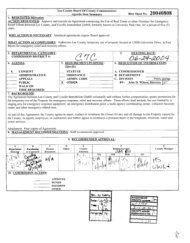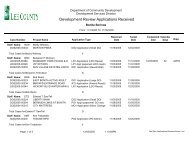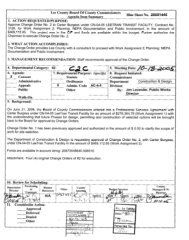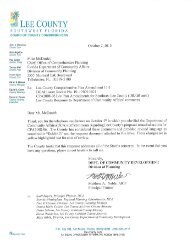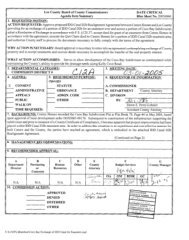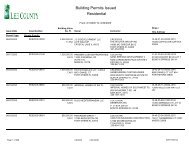P2 Quarterly Official Notice.... - Lee County Florida
P2 Quarterly Official Notice.... - Lee County Florida
P2 Quarterly Official Notice.... - Lee County Florida
You also want an ePaper? Increase the reach of your titles
YUMPU automatically turns print PDFs into web optimized ePapers that Google loves.
page 2 P 2 <strong>Quarterly</strong><br />
Occupational License, Hazardous Waste and Your Business?!<br />
For any business that operates in <strong>Lee</strong> <strong>County</strong>, an occupational license is required before operations can begin. Business<br />
owners should begin the process by deciding a couple of key issues that will dictate the steps to receive the occupational<br />
license. First the name of the business will determine if it needs to be registered as a fictitious name and/or a corporation<br />
with the State of <strong>Florida</strong>. If you are the sole proprietor and your legal name is in the name of the business, no registration<br />
with the State is required. Location of the office will require zoning approval from the authorized jurisdiction. Locations<br />
within unincorporated areas of <strong>Lee</strong> <strong>County</strong> will require zoning approval through the Department of Community Development<br />
located at 1500 Monroe Street in downtown Fort Myers. If within a city, contact that city’s zoning department for location<br />
approval. The next step is to verify if you are eligible to receive an approved Activity Certification Affidavit (ACA) from the<br />
Division of Natural Resources Pollution Prevention Program. You can call (239) 479-8519 or (239) 479-8126 or come to<br />
the Hazardous Waste counter located at 1500 Monroe Street in Fort Myers and find out if the business operations are<br />
eligible for the ACA. To determine this, a series of questions are asked. Should the business receive an approval, they sign<br />
an affidavit stating they do not generate any hazardous waste under the occupational license that will be issued for the<br />
business. The business then goes to the <strong>Lee</strong> <strong>County</strong> Tax Collector and pays the appropriate fee for their occupational<br />
license. When a business is not eligible for the ACA, they will pay an additional $20.00 attached to the occupational license<br />
at the Tax Collector’s Office.<br />
When businesses pay the surcharge they provide funding for the State mandated notification, verification and assessment<br />
program also known in the past in <strong>Lee</strong> <strong>County</strong> as the Small Quantity Generator Program. The program in <strong>Lee</strong> <strong>County</strong> has<br />
evolved into the nationally recognized <strong>Lee</strong> <strong>County</strong> Pollution Prevention (<strong>P2</strong>) Program. The <strong>P2</strong> Program performs on-site<br />
assessments throughout <strong>Lee</strong> <strong>County</strong> for all businesses paying the $20.00 surcharge attached to their occupational license.<br />
The assessment helps to determine the status of a facility and which State and Federal regulations apply to their operations.<br />
They also receive quarterly newsletters and immediate assistance with hazardous waste management requirements. The <strong>P2</strong><br />
Program offers Best Management Practices (BMP’s) for specific businesses and guidance sheets on how to handle other<br />
certain types of potentially harmful waste.<br />
We have experienced and knowledgeable Senior Environmental Specialists (SES) that will come to your business and look<br />
at the operations. It is similar to the inspection the State would do only with one major difference, we don’t issue fines, we<br />
offer waste management solutions. The SES will explain the documentation that you need to keep on file to protect your<br />
business investment from expensive fines. They will assist in the proper management of your waste to insure everything is<br />
within compliance as required in the law. So when the State’s Department of Environmental Protection (DEP) visits your<br />
company you will feel confident that it is safe from costly fines.<br />
Don’t Be Fooled by Statute Limitations<br />
Over six years after their disposal, Ohio state officials discovered approximately 300 leaking drums of hazardous waste<br />
buried under piles of old tires and automobile parts at an auto salvage yard. Identifiable information on the drums led<br />
officials to the owners, Budd Brothers d/b/a Century 21 Painting of Austintown Ohio. Brothers maintained he could not be<br />
held liable because the statue of limitations had expired. A state of appeals court upheld a lower courts decision ruling that<br />
the statues of limitations were continuing because the drums were leaking at the time of discovery. Brothers was ultimately<br />
responsible for its hazardous waste disposal management. The “cradle to grave” rule means just that, the generator of the<br />
hazardous waste is responsible for the management of the hazardous waste they generate. They were charged with six<br />
counts: 1) illegally transporting hazardous wastes, 2) failing to evaluate wastes, 3) illegally disposing of hazardous wastes,<br />
4) illegally storing hazardous wastes, 5) criminal endangering, and 6) failing to complete a hazardous waste manifest.<br />
Brothers was required to pay $120,000 plus interest to the Hazardous Substance Superfund over a period of eighteen<br />
months. Could this happen to your business? Yes, if you do not conduct business with reputable firms, the “cradle to grave”<br />
rule can be costly to your operations and your integrety in the community. Ask questions, require referrences and shop<br />
around for the best service that meets your needs to assure compliance at resonable cost.



